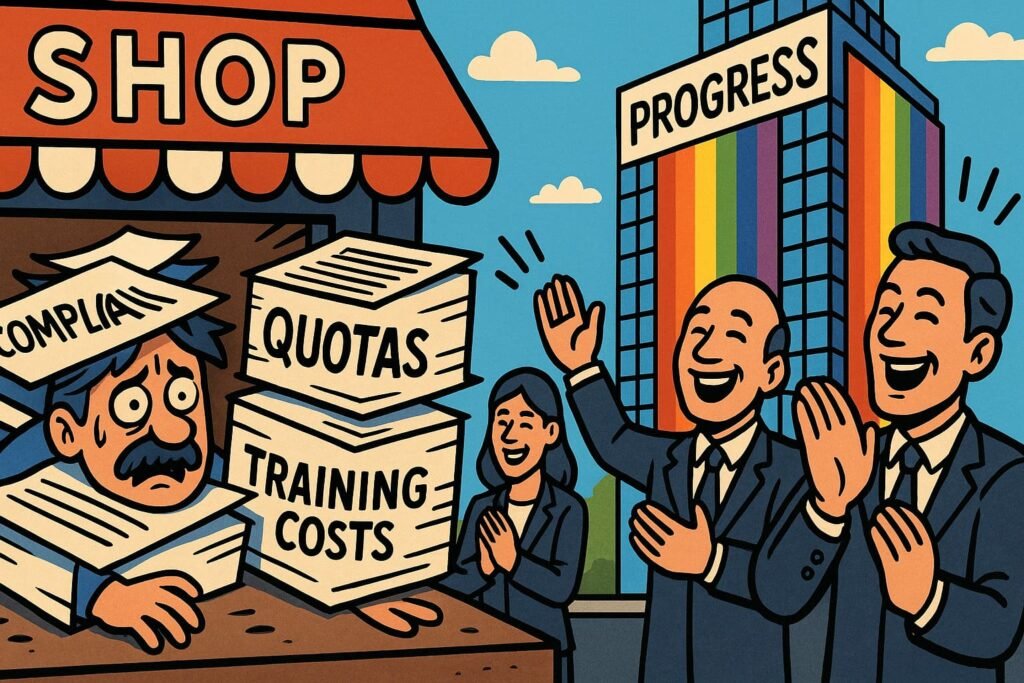Costs for Small Business – Woke Rules, Big Burden
Introduction
When a global corporation rolls out new woke policies, it’s a branding exercise. When a small business tries to keep up, it’s a nightmare. From mandatory diversity training to ESG compliance and reporting, the costs pile up — and the burden falls hardest on those least able to carry it.
While big firms turn woke politics into glossy PR, small businesses face bureaucracy, expense, and red tape. The result? A playing field tilted in favour of the giants.
Table of contents
The Compliance Trap
Woke rules don’t stop at slogans. They come with:
- Training workshops on “awareness” and “bias.”
- Quotas and hiring targets.
- Paperwork-heavy reporting systems.
- Extra HR oversight, even when the “HR department” is just the owner.
For a global bank, this is a line item in the budget. For a corner shop, it’s money they don’t have and time they can’t spare.
The Big Business Advantage
Here’s the cynical twist: woke politics helps the corporations it was supposed to restrain. Large companies can absorb the costs of compliance, spin it into marketing, and brag about their “commitment.” Smaller competitors, meanwhile, drown in forms and costs.
It’s not fairness — it’s cartel building, with woke slogans as the cover story.
Tokenism Over Talent
Small businesses under pressure may end up hiring or promoting based on quotas instead of talent. This isn’t diversity — it’s tokenism. It can breed resentment among staff, undermine morale, and make the workplace more divided, not less.
Meanwhile, corporations polish their image with glossy brochures and rainbow logos, leaving small firms stuck with the bill.
The Hidden Costs
Beyond money, there’s the cost in spirit. Owners lose time that should go into customers and growth. Employees lose trust when policies feel forced. The community loses when small firms close because compliance was too costly.
The irony? Woke politics, supposedly about fairness, ends up reinforcing monopoly power.
Who Really Wins?
- Corporations that lock out competitors.
- Consultants who sell training and certifications.
- Politicians who claim progress while ignoring the fallout.
The losers are small businesses, their workers, and the local communities that depend on them.
Conclusion
For small businesses, woke politics isn’t a slogan. It’s another bill, another form, another burden. Big companies turn it into branding. Politicians turn it into photo ops. Consultants turn it into income.
And the rest? They turn off the lights.
Next time you hear a CEO brag about their “commitment to diversity,” ask: is this progress, or just another way to squeeze the little guy?
FAQ Section
How does woke politics affect small businesses?
By adding compliance costs, mandatory training, and quotas that large corporations can absorb but small firms cannot.
Why do big corporations benefit?
They have the resources to comply, spin woke policies into PR, and use the rules to squeeze out smaller competitors.
What are the hidden costs for small business?
Lost time, added bureaucracy, employee resentment, and in some cases, closure.
Who benefits from these rules?
Corporations, consultants, and politicians — not the small businesses struggling to stay afloat.



